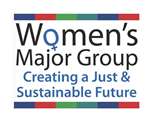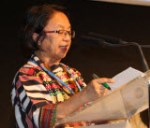Published on Sat, 2015-09-26 00:00
The Women’s Major Group, bringing together over 600 national and international women’s CSOs, continues to be actively engaged in the 2030 Agenda for Sustainable Development. They want to contribute to the success of the 2030 Agenda, and the implementation of the Sustainable Development Goals in all countries, and help achieve real transformative change towards gender equality, human rights, and responsible and equitable stewardship of the earth’s climate and natural resources. In that sense of a constructive contribution by the women’s organisations. They expressed that although it is good that many different people have become engaged in spreading the word about the 2030 Agenda and the 17 SDGs, the group we call on leadership from the UN to avoid trivialization and over-‐simplification in the main messages to the public. The need to maintain integrity and forward momentum of the SDGs in substance and scope in all messages coming from the UN. |
Published on Fri, 2015-09-25 15:14
The Sustainable Development Goals (SDGs) negotiated painstakingly over two years by all UN Member States with thousands of public interest organizations providing their commitment and expertise have been copyrighted. And by whom? The UN you would think? But no. They have been re-branded as Global Goals (GGs) and the copyrighted by Project Everyone, a private company incorporated and registered in London. On its own website (www.globalgoals.org), Project Everyone claims ownership of the 17 icons that it is popularizing, with active help from celebrities and the UN Secretariat itself, representing each of the 17 Goals that the heads of State and Government are endorsing this week as common objectives of humanity from here to the year 2030. |
Published on Fri, 2015-09-25 09:20
Indigenous women and girls experience complex, multi-dimensional and mutually reinforcing human rights violations, with abuses of their collective, economic, social and cultural, as well as civil and political rights being varied and severe. This is one of the main findings of the report of the Special Rapporteur on the rights of indigenous peoples, Ms Victoria Tauli-Corpuz, to the Human Rights Council, which is currently holding its regular thirtieth session. |
Published on Fri, 2015-09-25 08:54
Leaders of United Nation Member States are set to endorse the Post-2015 Sustainable Development Framework (now to be called the 2030 Agenda for Sustainable Development) at the General Assembly on 25-27 September 2015. Following what has been a long and at times arduous process to develop and agree this framework, throughout which the Trade Union movement has been actively engaged, the Post-2015 Summit in September will no doubt go down as an historic event. There are definitely grounds for celebration, not least simply because an agreement was actually reached, signalling a win for multilateralism on the whole, but also because it represents the culmination of one of the most inclusive efforts by governments to include the voices of civil societies and other non-state, non-executive actors in an international agreement. It would be fair to say that this is reflected in the level of ambition achieved in key parts of the outcome. Nevertheless, some reservations and concerns remain. |
Published on Fri, 2015-09-25 08:46
More than a hundred Heads of State and Government will gather in New York this week to adopt the 2030 Agenda for Sustainable Development. This agenda is intended to make the UN ‘fit for purpose’, but it is important to ask, ‘whose purpose will it be fit for’? A new study from Global Policy Forum warns that the United Nations is embarking on a new era of selective multilateralism, shaped by intergovernmental policy impasses and a growing reliance on corporate-led solutions to global problems. The changing funding patterns of the UN and its funds, programmes and specialized agencies reflect these alarming trends. Key features are the growing gap between the scale of global problems and the (financial) capacity of the UN to solve them; the growing share of non-core contributions and earmarked trust funds in UN finance; increased reliance on the corporate sector; and the outsourcing of funding and decision-making to exclusive global partnerships. |








